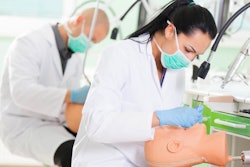
Young dentists testified before members of the U.S. House of Representatives on June 12 to urge lawmakers to consider strategies for student debt relief.
During a hearing of the House Committee on Small Business, dentists and other medical professionals spoke about how student loan debt has affected their personal and professional lives.
One such dentist, Lauren Weise, DMD, said debt derailed her plans of small business ownership. Dr. Weise, who spoke on behalf of the American Association of Orthodontics (AAO), will graduate from the University of Maryland's orthodontics residency in June with almost $400,000 in student loans, not including a $120,000 interest-free loan from her parents or her husband's student loan debt.
"My initial dream was to own my own practice and run a small business, but we are not in any position to be able to do this anytime soon, likely not for the next 10 to 15 years," she said in her testimony. "The reality of my life is that I am 30 years old, newly married, and planning for my husband and I to move back in with my parents this summer to save money."
Dr. Weise's story is not uncommon -- dental graduates' student loan debts have skyrocketed in recent years. In 2018, the average dental graduate accrued $285,184 in student loan debt, according to the American Dental Education Association. The figure is even higher for specialists.
The average orthodontist has $428,150 in debt, and another quarter of orthodontists have or expect to have at least $600,000 in debt by the end of their residency, according to a 2018 AAO survey. The majority of these dentists have had to change their plans for where they live, if or when to start a family, and whether to buy a practice.
While Dr. Weise didn't offer any solutions in her testimony, some young dentists urged Congress to reauthorize the Higher Education Act, which would lower interest rates on federal student loans and allow for dentists to defer interest accrual during their residencies. However, even if Congress does provide student debt relief in the future, the lives of new dentists may already be altered.
"To consider taking on additional debt to purchase or start a practice is almost inconceivable," Dr. Weise said. "Many young orthodontists, including most of my classmates, will be forced to face this harsh reality that they may need to follow a more corporate dental route long term in lieu of following their dreams of opening a practice or purchasing one and becoming a small business owner."



















